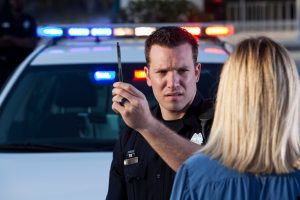Field sobriety tests (FSTs) are a common tool used by Fort Lauderdale law enforcement officers to determine whether a driver is impaired. These tests are often administered roadside after an officer pulls over a driver they suspect of driving under the influence (DUI). However, the accuracy and reliability of these tests are not as solid as they may seem. As a Fort Lauderdale criminal defense lawyer, I see firsthand the limitations of FSTs, which can be affected by numerous factors unrelated to alcohol. Understanding these limitations and possible defense strategies can be crucial to protecting your rights if you’re facing a DUI charge based on field sobriety test results.
Types of Field Sobriety Tests
There are three main types of standardized field sobriety tests that Fort Lauderdale officers use, which were developed by the National Highway Traffic Safety Administration (NHTSA):
- Horizontal Gaze Nystagmus (HGN) – During this test, the officer asks the driver to follow a small object, like a pen, with their eyes. The officer looks for involuntary jerking of the eyes, which is believed to be more pronounced when someone is under the influence of alcohol.
- Walk-and-Turn Test – This test requires the driver to take nine steps, heel-to-toe, along a straight line, turn, and walk back in the same manner. The officer observes for signs of impairment, such as losing balance, missing steps, or failing to follow instructions.
- One-Leg Stand Test – Here, the driver must stand on one leg with the other about six inches off the ground while counting aloud. The officer watches for indicators of impairment, such as swaying, using arms for balance, or putting the foot down.
Limitations and Inaccuracy of Field Sobriety Tests
Field sobriety tests are subjective and can often yield inaccurate results. While these tests may be standardized, they are still susceptible to human error, environmental factors, and the physical condition of the driver.
Some common limitations and inaccuracies that can arise:
- Physical and Medical Conditions: Certain medical conditions, such as inner ear disorders, neurological issues, or physical injuries, can mimic signs of impairment, leading to inaccurate results. For example, someone with vertigo may struggle with balance during the one-leg stand test, even if they are not impaired.
- Environmental Factors: Uneven road surfaces, weather conditions, poor lighting, and nearby traffic can all affect the accuracy of field sobriety tests. If the walk-and-turn test is performed on an uneven surface, a sober person may have difficulty maintaining their balance.
- Officer Interpretation: FSTs rely heavily on an officer’s interpretation of the driver’s performance. Officers may unintentionally misinterpret a driver’s actions, particularly if they expect impairment. Small errors, like missing a step or swaying slightly, may be noted as signs of intoxication even when they aren’t.
In the landmark case of State v. Taylor, 648 So. 2d 701 (Fla. 1995), the Florida Supreme Court recognized that field sobriety tests are not scientifically reliable for determining intoxication and that these tests must be corroborated by other evidence to hold up in court. This case underscores that FSTs alone do not definitively prove impairment and may be challenged in a South Florida courtroom.
Defense Strategies for Challenging Field Sobriety Tests
An experienced criminal defense attorney in Fort Lauderdale can employ a variety of strategies to challenge field sobriety test results in DUI cases.
Some common criminal defense strategies:
- Challenging the Administration of the Test: Florida courts have emphasized the importance of following NHTSA guidelines for administering FSTs. If an officer fails to follow these guidelines precisely, the validity of the test results can be questioned. An attorney may argue that improper administration made the test unreliable, which can lead to the results being dismissed.
- Introducing Medical Evidence: Some drivers have legitimate physical or medical reasons for failing field sobriety tests. For example, courts have acknowledged that factors unrelated to alcohol could influence FST results. A Broward DUI defense attorney may use medical records or expert testimony to show that an underlying condition, rather than impairment, caused a poor performance on the test.
- Questioning Environmental Conditions: Field sobriety tests are often conducted on the side of the road, where conditions may be less than ideal. An attorney may argue that uneven pavement, poor lighting, or inclement weather affected the client’s ability to perform the tests accurately. Documenting and presenting these environmental conditions can undermine the prosecution’s reliance on the FST results.
- Highlighting the Subjectivity of the Tests: The interpretation of FSTs relies on the subjective judgment of the arresting officer. Defense attorneys can argue that bias or human error played a role in how the officer evaluated the test results. This strategy is especially effective if there is no corroborating evidence, such as body cam footage, to substantiate the officer’s assessment.
- Introducing Alternative Evidence: If there is video evidence from a body cam or dashboard camera showing that the driver was able to walk, talk, and interact with the officer without showing signs of intoxication, it can significantly weaken the state’s case. This type of evidence can reveal discrepancies between the officer’s testimony and the driver’s actual behavior during the stop.
Why You Need a Fort Lauderdale Criminal Defense Lawyer for DUI Charges
 DUI charges in Fort Lauderdale can have significant consequences, including license suspension, fines, and even jail time. If your case hinges on field sobriety test results, having a skilled criminal defense lawyer by your side can make all the difference. Field sobriety tests are inherently subjective, and a defense attorney knows how to reveal the weaknesses in these assessments, potentially leading to a reduction or dismissal of charges.
DUI charges in Fort Lauderdale can have significant consequences, including license suspension, fines, and even jail time. If your case hinges on field sobriety test results, having a skilled criminal defense lawyer by your side can make all the difference. Field sobriety tests are inherently subjective, and a defense attorney knows how to reveal the weaknesses in these assessments, potentially leading to a reduction or dismissal of charges.
An experienced Fort Lauderdale criminal defense lawyer can conduct a thorough investigation into the circumstances surrounding the FSTs, analyze body cam footage, interview witnesses, and bring in experts to strengthen your defense. Even if dismissal isn’t possible, a skilled lawyer can often negotiate a lesser charge, reducing the penalties and impact on your life.
Field sobriety tests can feel intimidating, and they are not as conclusive as the prosecution may suggest. Understanding the limitations of these tests and the strategies for challenging them can significantly affect the outcome of a DUI case. If you’re facing DUI charges in Fort Lauderdale based on field sobriety test results, hiring an experienced defense attorney is essential to protect your rights and build the strongest possible case.
Call Fort Lauderdale Criminal Defense Attorney Richard Ansara at (954) 761-4011. Serving Broward County.
Additional Resources:
F.S. 316.193, Driving under the influence; penalties
More Blog Entries:
Can You Get a DUI Charge Dismissed? Common Defense Strategies of Fort Lauderdale DUI Lawyers, Nov. 6, 2024, Fort Lauderdale Criminal Defense Lawyer Blog
 Fort Lauderdale Criminal Attorney Blog
Fort Lauderdale Criminal Attorney Blog


